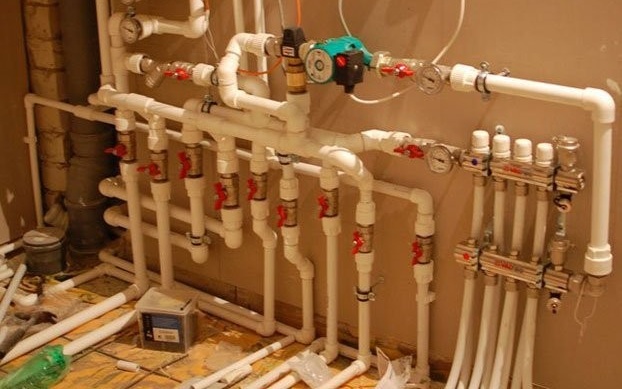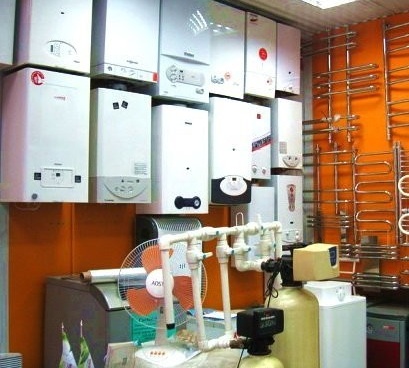Condensing heating boiler: 109% efficiency for heating your home
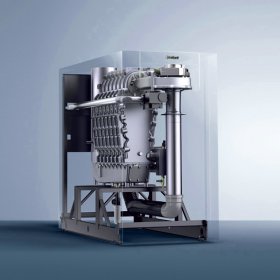
The range of heating boilers presented in retail chains is unusually diverse and wide. Today there is an opportunity to purchase not just a good, but almost technically perfect unit. Do you think these do not exist? You are wrong. Condensing boilers - the true embodiment of environmental friendliness and efficiency, are rapidly and confidently conquering the market. Unlike typical gas boilers with an efficiency of about 85%, condensing units are able to consume fuel more economically - and at the same time demonstrate an efficiency of 95-96%. In this regard, rational Europeans encourage the widespread use of such equipment, even at the legislative level.
Despite the relatively high cost of condensing boilers compared with the "usual designs", the first ones successfully and quickly pay off in the context of a continuous increase in gas prices. Condensers are offered by almost all the leading manufacturers of heating equipment - Vaillant, Junkers, Ferroli, Baxi, Viessmann.
Condensation of water vapor resulting from the combustion of hydrocarbons is one of the most promising innovative technologies for heat production. That is why it is safe to say that the future lies with such units.
Content
A bit of progressive development history
The first "representatives" of condensing boilers appeared back in the 50s. Naturally, these models were very, very far from perfect - but they showed real fuel economy even then. Their key disadvantage was the fragility of structural elements in contact with aggressive condensate. Steel and cast-iron heat exchangers suddenly fell into disrepair under the onslaught of ruthless corrosion, and the device failed.
Condensation boilers, as similar as possible to modern ones in design and quality, the world saw in the 70s. Their heat exchangers were already made of stainless steel - a durable and reliable material.
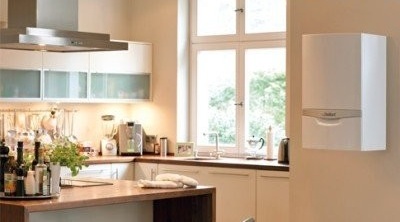
Modern condensing boilers are the embodiment of economy, environmental friendliness and high efficiency. According to many experts, they are definitely waiting for a promising future in the heating equipment market
Various studies and developments regarding the use of "latent energy of vaporization" were in the Soviet Union, but for many reasons they did not succeed in becoming mass and global.
The principle of operation of such units
As you know, the principle of operation of any heating boiler is extremely simple:
- Burns fuel.
- Thermal energy is released.
- Thermal energy through the heat exchanger "enters" to the coolant.
Naturally, not without heat loss.In a traditional gas boiler, the exhaust gases “escape” through the chimney into the atmosphere; part of the unused heat is left with them, because together with the gases, water vapor is also lost, which is formed during the combustion of fuel.
This steam contains precisely the hidden energy that condensation boilers can store and transfer to the heating system. Extraction of “precious heat” is made possible by the condensation of steam in a special heat exchanger.
The flow of water ("return") cools the vapor to the dew point temperature; the energy released during vapor condensation is absorbed by the same water.
Condenser heat exchangers are made exclusively from corrosion-resistant materials - stainless steel or silumin, since the practical use of condensate, unfortunately, does not improve its chemically aggressive composition.
Typically, condensate is collected in a special tank built into the unit, and only then it is discharged into the sewer. Due to the high aggressiveness of this product of the "vital activity" of the boiler, different norms and rules for its allocation were adopted in different countries. In some, condensate is allowed to be sent directly to the sewer, in others it must be neutralized first. Condensate neutralizers are offered by many manufacturers. What are they? These are granule-filled containers containing calcium or magnesium compounds.
Determination of the real boiler efficiency
Condensation boilers can be easily “introduced” into both traditional and low-temperature systems like underfloor heating. Working in tandem with the latter, these units demonstrate unusually high efficiency, since the conditions for condensation are created almost ideal.
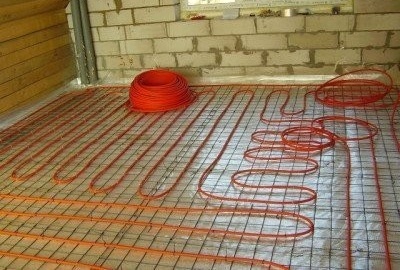
Proper installation of the "condensing boiler + underfloor heating" system allows you to completely abandon radiators and operate underfloor heating as the main rather than auxiliary heat source
It is often heard that the efficiency of a condensing boiler can reach a fantastic 109%. Such bold statements by manufacturers usually amaze people who are even a little versed in physics. After all, it turns out that virtually perpetual motion machines appeared on sale! In fact, this is an exclusively marketing move, designed only to draw attention to the development, and in no case claims to scientific truth. But how did this figure come about? It turns out that the efficiency factor that is 100% off scale is the result of a careful comparison of condensers with ordinary gas boilers.
“Nonsense” is explained by experts as follows: the efficiency of a typical boiler is calculated by the net calorific value, without taking into account the heat “flying into the pipe”, and with such mathematics is 92-95%. The efficiency of the condensing boiler by this calculation method is as much as 100%. If we add to it an 8–9% “charge of energy” from the use of the latent heat of condensation, we will get “phenomenal performance”. But this is all conditional.
If you make objective calculations, it turns out that the efficiency of standard units is only 84-86%, and condensation - a little more than 95%. And this is under ideal conditions.
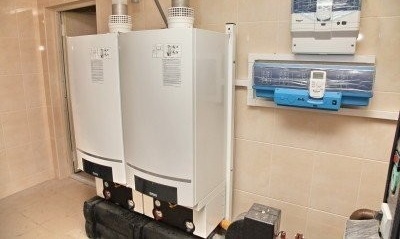
The condensation boiler can always be equipped with modern weather-dependent automation. It controls the boiler, focusing on the average daily temperature, thereby further increasing the efficiency of the equipment
Condensing boilers - equipment with a closed combustion chamber. Air supply, removal of combustion products is carried out in a "forced manner". They do not need a classic chimney and are quite safe. They can be connected to such smoke removal systems as a two-pipe system, a coaxial chimney, etc.
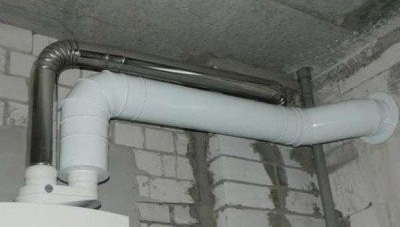
The relatively low temperature of the products of combustion of condensers allows you to equip a flue system for them using plastic pipes. This allows you to save a little, which can not but rejoice
Should I buy a "condenser"?
Condensers are wall and floor. The power of the first, depending on the model, can be up to 120 kW, the second - up to 320 and more kW. If it is necessary to increase the capacity of the plants, it is possible to link the boilers into a cascade.
Depending on the purpose, distinguish single-circuit and double-circuit condensing boilers. Single-circuit - exclusively to solve the issue of heating; double-circuit - this is heating + DHW.
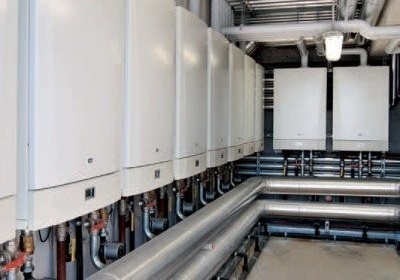
The cascade connection of condensing boilers makes it easy to organize a compact, easy-to-use boiler room, capable of demonstrating tremendous savings during the transition period
Still in doubt, is it worth it to acquire a condensation boiler and have high hopes for it? An objective look at the advantages and disadvantages of this equipment will help you make the right choice.
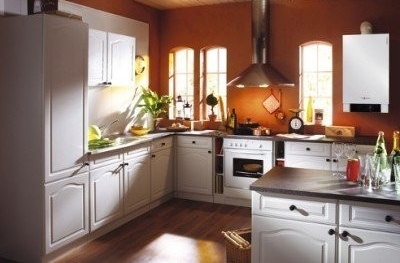
Condensing boilers have characteristics that exceed even the most stringent requirements for heating units by certification bodies. They are recommended for installation in protected and resort areas. The number of harmful emissions from condensing boilers is 5-8 times less than gas
The main advantages of the units include:
- Extreme compactness. A condenser with a power of up to 120 kW can always be found in a wall-mounted design. Traditional boilers of the same capacity are, as a rule, exclusively floor-standing, therefore, they take up much more space;
- Light weight;
- High efficiency;
- Deep modulation;
- Savings on the installation of the chimney;
- Environmental friendliness - a minimum of harmful emissions into the environment;
- Reduced vibration;
- Low noise. Properly thought-out design of the units allows you to almost completely eliminate noise effects. The operation of boilers of this type inside residential premises does not cause any discomfort;
- And most importantly, a significant reduction in gas costs - from 10% to 35%, depending on the "initial conditions".
Of the minuses of the equipment it is worth noting:
- Very high cost. A condenser will cost 40-120% more expensive than a conventional boiler;
- Inefficiency in severe frosts. When there is a severe frost on the street, the water temperature in the heating system definitely has to be raised. If the temperature of the return water exceeds 60 degrees, the condensation boiler will not be able to fulfill its miraculous function and will switch to normal boiler mode with an efficiency of about 85%.
Practice shows that, despite all the nuances, condensing boilers are the right choice for thoughtful owners who value competent economy and are eager to bring maximum thermal comfort to their home. Please note that you can enjoy a truly effective system based on a condensing boiler only if you trust competent professionals in the selection and installation of equipment.
